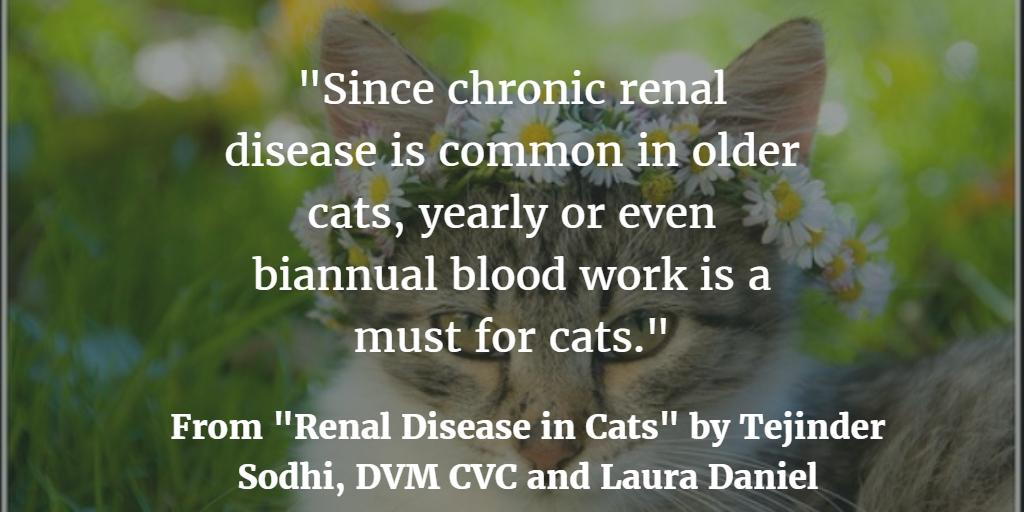
Renal Disease in Cats
Last month, we looked at renal health in dogs. This month, we will review the kidney form and function in cats, discuss the signs and symptoms of acute and chronic renal failure cats, and what you can do about it.
Cat kidneys perform the same function as in dogs. They filter the cat’s blood to remove wastes. Blood passes through the millions of nephrons that take in blood with waste products; the waste products are filtered out by the glomerulus, passed through tubules and sent through the ureters to the bladder for removal, while the filtered blood is sent back to the rest of the body. Kidneys also control blood pressure by causing arteries and veins to constrict and increasing circulating blood volume. The kidneys also aid in calcium metabolism and control the amount of calcium in the blood and does similar for phosphorous. Finally, the waste products removed from kidneys are the electrolytes sodium, potassium, chloride and bicarbonate. Creatinine wastes from the muscles are also removed. Kidneys maintain electrolyte balance (homeostasis) despite changes in hydration. Failure of the kidneys to operate correctly can be acute or chronic. Cats, in particular, have evolved kidneys that are very efficient at utilizing the minimal water in a desert environment. Unfortunately, this efficiency means that cats are at a greater risk of developing chronic renal failure in their senior years than dogs. However, they can live with chronic renal disease much longer than dogs.
Acute renal failure is more common among younger cats, but can happen at any age. Signs of acute renal failure include: vomiting, listlessness, different breath odor, and changes in urination frequency. Blood work by your veterinarian also determines the diagnosis. Acute renal failure is often caused by exposures to toxins such as anti-freeze or toxic plants (such as lilies). Accidental overdoses on medications such as Ibuprofen and NSAIDS can also cause kidney damage. In addition, urethral obstructions by crystals or stones will also cause renal failure. Urethral obstructions are more common in male cats than females and will evidenced by the cat's inability to urinate. All of these causes are emergency situations and veterinary care should not be delayed. With prompt care, your cat's renal failure can potentially be reversed.
More common and sometimes harder for owners to initially catch, is chronic renal failure. This is a gradual diminishing of the kidney's ability to remove waste products from blood. The cat may appear to be listless, may lose weight, develop mouth ulcers and appear dehydrated. Your vet will determine a diagnosis by running laboratory tests such as blood and urine tests. Since chronic renal disease is common in older cats, yearly or even biannual blood work is a must for cats. And while chronic renal disease is not reversible, it's progression can be slowed. Many cats with CRF live for many years after their initial diagnosis by living on prescription diets available from your veterinarian. Since dehydration is a serious issue for CRF cats, your vet may recommend subcutaneous fluid administrations at home for your cat.
As one can see, renal disease is a serious issue affecting many cats. Only your vet can diagnose conclusively whether your cat has renal failure and offer treatment. If you notice any of the above-mentioned symptoms of renal disease, do not hesitate to take your cat to the vet.
